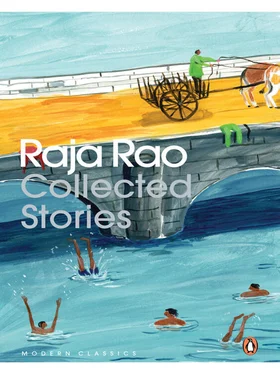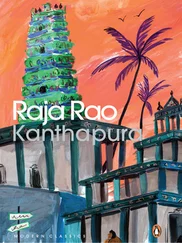Raja Rao - Collected Stories
Здесь есть возможность читать онлайн «Raja Rao - Collected Stories» весь текст электронной книги совершенно бесплатно (целиком полную версию без сокращений). В некоторых случаях можно слушать аудио, скачать через торрент в формате fb2 и присутствует краткое содержание. Год выпуска: 2014, Издательство: Penguin, Жанр: Классическая проза, на английском языке. Описание произведения, (предисловие) а так же отзывы посетителей доступны на портале библиотеки ЛибКат.
- Название:Collected Stories
- Автор:
- Издательство:Penguin
- Жанр:
- Год:2014
- ISBN:нет данных
- Рейтинг книги:5 / 5. Голосов: 1
-
Избранное:Добавить в избранное
- Отзывы:
-
Ваша оценка:
- 100
- 1
- 2
- 3
- 4
- 5
Collected Stories: краткое содержание, описание и аннотация
Предлагаем к чтению аннотацию, описание, краткое содержание или предисловие (зависит от того, что написал сам автор книги «Collected Stories»). Если вы не нашли необходимую информацию о книге — напишите в комментариях, мы постараемся отыскать её.
Collected Stories — читать онлайн бесплатно полную книгу (весь текст) целиком
Ниже представлен текст книги, разбитый по страницам. Система сохранения места последней прочитанной страницы, позволяет с удобством читать онлайн бесплатно книгу «Collected Stories», без необходимости каждый раз заново искать на чём Вы остановились. Поставьте закладку, и сможете в любой момент перейти на страницу, на которой закончили чтение.
Интервал:
Закладка:
XI
The power of man is to sow, the berth of women to reap. The bullocks may plough the field, the birds go plucking bugs and berries through trees, the shout of man come through all of space as if in a known straight line — the elephant will browse by the railway platform, the camels carry tight perched burdens on their humps, but the river’s flow is like a name— it shines through its own insistence. Boats ply as in a silent dream, as though time and movement were one, but space the meaning of sight, and all of human geste but a play on oneself. Man is not a beast of burden but a song to sing, and the earth a temple-garden where we sow what we pray. For prayer is life, and life breath and substance, that men wean not away from truth. So that every word is a sacred name and every name a true sound. Let us hear the anahata , the heart-sound, that we know ourselves, and that the river flow.
What if the river should stop, Lord? (Like once she did, you remember, when you held her thunderous flow in your topknot, the moon smiling above her). What might the Vedas do then, and the fishes and the seeds and the sounds and the elephants? O, let water flow, Lord, that the earth turn not away from its fulcrum, whirl, earth, that the Ganga flow, round and around on herself, from earth to sky and from the heavens back to the Himalaya. The circle is the end of all beginnings as the Ganga is of water. For, where the flowing ends— ap , the isisness of water begins. So, now Ganga, flow.
Death has no meaning. Man’s approbation is for the true. Sit with me and let us listen. The river has depth, and, see, the birds have flight. The boat has eyes, and the bridge its leap. Yet must man wallow with the donkey or the child play with flies. In the gullies of Benares the smells are exuberant, the ladies’ shy — shyness curves their saris to bent innocuity, but man’s passion is in the starved shine of his eyes. The gutters go their way making time, carrying little broken claypots (that milk and tea and curd have used for man’s satiations, and that ritual purity has destined for their formal destruction) — the gutters have broken baskets, little threaded sweetmeat trays, an ant-eaten umbilical cord, torn sackcloth on which bees sit for a better taste of funeral honey. The gutters leap through the side streets, open up by corners, and gay they go half-full with dark moving fluids to any Ganga ghat, and leap down under pipal trees. For all of here must be holy, and even the sewage has to rush in cascades, and be hallowed by the pipal’s knotted roots.
Man’s illumination, however, is of the mind, yet he shapes his utensils for proof of his material disposition. I am a pilgrim, so I have a pot. One pot. Big pot. Small pot. Brass pots with tusk-beaks or silver ones with swan-heads, pots with cow-mouths or pots with just arches carrying handless, pots are pots and the Ganges has no choice. You dip and you bring it to your pilgrim room and wax-covered, you take it back home to Maharashtra, Bhuvaneshwar or Rameshwaram, and, place it securely in your sanctuary, by the flower-covered gods. Ultimately, when the time comes, you ask your son, uncle or grandfather for the Ganga- jal as you begin to heave a heavy breath and you sputter yourself in, and now move into immortality. But the problem is, how immortal can you be? For that matter the dog that floats down the Ganga is even more immortal. Its mortal body is all afloat on the Ganges. And that of drowned pigs as well.You, dark and bloated pig, you know you too are immortal. Life is a grave game, oh, ye Brahmins. You talk so much of immortality. It is all a contribution to your purse. The mantra is money. The temple bell is for begging. The puppy’s yell is for the mother. Mother never gives birth to a child for all end at the Ganga Ghat.
The puppy sits on that ash and dung-heap and cries. Its one eye is sore. Flies do not leave him in peace. So, he cries for his mother. The donkey, above him, finding no cucumber scrap to chew shakes its head to wave off its flies, and tries to suck the puppy’s ears. But the donkey’s flies prefer the larger ear. And somewhere there a child’s undershirt lies in flowery rags. Whose child might it have been? How tenderly its mother must have pressed him to her rounded breasts. The rag is a sign that in life’s finality nothing matters. The fact that you live at all is the miracle.
For, in Benares the living are the miracle. They can walk on their bamboo legs, their lathis and their turbans proving their strength — in Benares men even talk. Whence did they get their strength? For their silent moving mass is like those toppled palaces, their own platform self-sustaining above Ganga’s rubble — a tree shoots from that ruin to prove life’s insistence, but by the next flood the platform will also fall to the depths from which no one will ever retrieve its stones. The maharajas have all gone, anyway, you must remember. Empires have fallen thus. Indeed all of structures’ destiny is decay and disappearance. The fact of existence is just this — action and reaction. Action and reaction again. Why should one be born? Why should one sorrow? The turrets and carvings of Benares architecture seem to name life as real, yet only death appears to shine here as true meaning.
Son, has death meaning? No, death is an empty event. It’s like the yowl of a crow, the son of a barren woman. Can life die, that is the question? The Ganga answers: Man, you think you die. Burn yourself on my banks and know that what flows cannot but unflow. Death is a superstition, like the flies that sit on the baby’s rags, and find nothing there. Is the donkey’s bray a song? How can you, who have a name, die? If the Ganga cannot grow dry one will never know death. Hence is she, the Mother of compassion.
Man is mortal is the grandest fib man ever invented. Foolish is man in trying to believe in such a lie. When knowledge, as Ganga, as jnana-ganga , flows, death is dissolved into truth. She is, as Sri Shankara said: She is nija bodha rupa , she, the form of Consciousness pure.
I do not know why I came here. Raja is a name given to the nameless, as wave is for water, as sound a name given to volute silence. Why then should I be here? How could I be here? Where is the here, where I am? A point is no space. Nor do a series of points make space, as a series of perceptions make not an object. The object is not in seeing but in perceivingness. There is no here, Lord, there is no space, no movement, therefore I am the Ganga that flowing flows not. For where ends the flow? Nowhere. Where there is no end there is no beginning. Anything that is non-existent at the beginning and also at the end, does not exist in the middle either, says the Great Gaudapada Acharya. He was, as you know, the Guru of the Guru of Sri Shankara himself. Thus, you fool, realize; the Ganga never flows.
How simple is the truth if only we listen to ourselves. But we prefer to listen to the crows on the Ganga ghat, to the chatter of Brahmins at the funerals (and in our temples) and to the ekka drivers (who frighten you with talks of death and taxation) and to those dead to death, the sadhus. The fact of the fact is simple. One cannot go to the Ganges. One cannot go to the ‘I’. For if you dare have a deep look on the Ganges evenings, and see the Ganga unflowing, then you know there is no Ganga. Water is just water. So, O Mother Ganga, please be gracious, and — flow.
Notes
1. Raja Rao, The Policeman and the Rose: Stories . Delhi: Oxford University Press, 1978, p. xiv.
2. Raja Rao, The Chessmaster and His Moves . New Delhi: Vision Books, 1988, p. 1.
3. R. Parthasarathy, ‘The Future World Is Being Made in America: An Interview with Raja Rao’, Span (September 1977): 30.
Читать дальшеИнтервал:
Закладка:
Похожие книги на «Collected Stories»
Представляем Вашему вниманию похожие книги на «Collected Stories» списком для выбора. Мы отобрали схожую по названию и смыслу литературу в надежде предоставить читателям больше вариантов отыскать новые, интересные, ещё непрочитанные произведения.
Обсуждение, отзывы о книге «Collected Stories» и просто собственные мнения читателей. Оставьте ваши комментарии, напишите, что Вы думаете о произведении, его смысле или главных героях. Укажите что конкретно понравилось, а что нет, и почему Вы так считаете.












